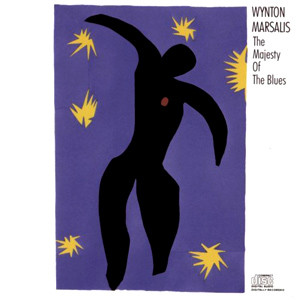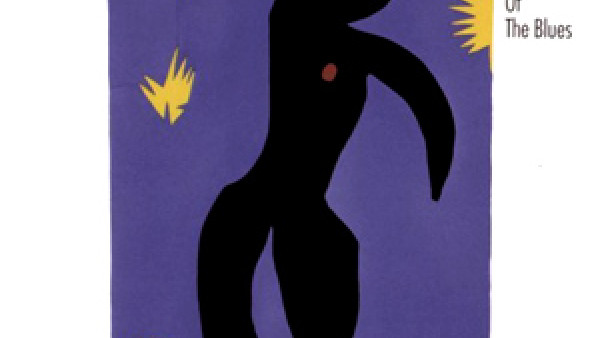Dealing with Those Bluses
IN HIS CONCERT performances a few years back, Wynton Marsalis dispensed jazz music like it was cod liver oil. He would make the horn sound spitting mad, then offer miniature jazz-history lessons, lashing out at what he believed were lower forms of music. This is good for you, ignorant swine.
These days, Wynton Marsalis – once hailed as the savior of improvised music, the man who put jazz back into suit and tie – has changed his tune. He’s thinking smaller, less evangelically. Less about other people’s careers. More about the music.
“You can’t overlook what people will dig,” he now says, wisened by the road. “When I first started touring, I thought there was only a small segment of the population interested in this music. That comes from looking at TV, which reinforces that perspective. But people all over do want what I do. You can’t feel it’s above people or it’s too hip. And you can do a lot of things in your playing to bring people closer to the music. If you present people with quality and be natural about it, they’ll dig it”.
No longer the angry young man, Wynton Marsalis, at 27, shows signs of having learned a few lessons. Both the musical ones which he’s been attending to right along, investigating hard bop, the Miles Davis ’60s quintet, anything else that might contribute to his understanding of the “roots” and the changes in attitude required of Wynton Marsalis, star.
It would be one thing for him to spout a new, more thoughtful philosophy and then return to the bandstand with the same mercurial approach to music, which acknowledges the past but stops short of revivalism. Certainly the legion of yuppie fans, who turn anything with his name on it into a gold record, would not object.
But, remarkably enough, the transformation of Marsalis’ attitude from a state of purist arrogance to something resembling grace is mirrored in his music. Leaving behind the complex composerly style he honed on J Mood and Black Codes From the Underground, the trumpet virtuoso has sought simplicity, reaching back further into jazz lore than he ever has before – to the blues and the ceremonies of New Orleans.
The just-released The Majesty of the Blues (Columbia) contains a half-hour suite,“New Orleans Function,” that is Marsalis’ interpretation of a jazz funeral. It consists of a slow dirge and a eulogy – the deceased is jazz music itself; the sermon was written by jazz critic Stanley Crouch and is delivered by the Rev. Jeremiah Wright of Chicago – as well as a parade-style finale.
If the thunderous jazz-will-survive sermon proves Marsalis hasn’t lost his loquaciousness, the rest of the piece shows that he’s allowing more raw emotion into his improvisation. “I knew after the last album (Live at Blues Alley) that there had to be a different direction,” Marsalis says.
While some critics assailed his group for its debt to Miles Davis’ ’60s quintet, he believes the music he made during that time, often fast and frenetic, was fundamentally new: “No other group was playing like that. Eventually, that will be assessed. But then, Duke Ellington’s late period hasn’t been assessed yet”.
Innovations – real or imagined – aside, Marsalis recognizes that he needed to change: “I had been pursuing a technical proficiency, and I began to want to express a broader range of experience.”
More about paring away than rebuilding, this new focus was informed by many experiences: This spring, Marsalis directed a high-school all-star big band from the East Coast that rehearsed nothing but Ellington. He was reunited with New Orleans musicians who had taught him as a boy an experience that brought up recollections of the ceremonies and brass-band functions he encountered growing up.
Ellington was the main model: “He had so many versions of the blues. They could go from the most superficial to the most profound, like what life is like. The blues have all of it the whole range of experience.”
Though still breaking in the new sextet Marsalis will put his reserved, reverent philosophy to work all summer in Manhattan, both on and off the bandstand. It’ll be there when he performs selections from The Majesty of the Blues at the JVC Festival next Friday night opening for Miles Davis. (Though there’s been an alleged rivalry between Marsalis and the currently fusion-minded Davis, Marsalis insists he has “no problem” sharing the bill.)
And it will be there again when he hosts a Snoopy-themed children’s concert devoted to explaining improvisation on Saturday afternoon. And at a Lincoln Center Q&A session on June 26. Perhaps most obviously, Marsalis’ desire to link the musics of yesterday and today is reflected in the selections he’s made as curator for Lincoln Center’s Classical Jazz series: In addition to a two-night tribute to Ellington (Aug. 9 and 10), he’s arranged tributes to Billie Holiday (Aug. 4), bebop pianist Bud Powell (Aug. 5), New Orleans pianist Jelly Roll Morton (Aug. 7), and saxophonist Benny Carter (Aug. 8).
SPEAKING AT THE END OF A THREE-WEEK BUS tour of mostly small towns, Marsalis doesn’t deny that he’s become an entire industry – and says he’s learning to accept the responsibilities that go along with the accolades and Grammy awards (eight so far) and media attention that follows him from project to project. Moguldom comes with the territory.
“It’s not a mission or a burden. It’s what I like to do. A whole lot of people have made it possible for me to have a forum like this, and whenever I can make things better for other people, or pass on information about the music that’s the least I can do.” To that end, he’s established an education foundation that channels time, money and speaking engagements into projects that further dialog about improvised music.
Part of Marsalis’ motivation to teach comes from his early training as a musician. Calling the teenage years “the most crucial part of a musician’s development” he’s been thinking lately about opportunities he missed, and it annoys him. He feels shortchanged by the education system: “We don’t even deal with the central function of the blues in the American culture. That’s like having someone who wants to be a writer, but they don’t want to deal with Hemingway.”
He began to get serious on the trumpet at age 12. For seven years, he played constantly, in a number of styles, but without much discipline – unguided, going in random directions. That changed when he moved to New York. “I got in touch with Crouch and other teachers and I started then to understand what was wrong. I had that 70s view – Everything is cool, just let it come out of you. I was into the sentimentality but not the tools. I had been acculturized against myself, because the people of my generation weren’t dealingwith traditional values.”
Once he came to that understanding, Marsalis started developing the requisite tools, learning the various schools of improvisatory thought from Art Blakey and others. And he put them right to work, recording his first solo jazz album at age 20.
“I was dealing with those blueses on my first album,” Marsalis says, using the affectionate New Orleans plural for the blues form. “I realized what it was I needed to address.” Whether he was successful then, Marsalis plowed steadily on, though he still had trouble with the jazz method of transferring information: “Part of the problem was – and is – that we are not getting the pertinent information from the older generation.”
Which, Marsalis explains, drove him to research the “beginning of the music” – the blues. And to a number of musicians he learned from while growing up: banjo player Danny Barker, clarinetist Dr. Michael White, trumpeter Teddy Riley, and trombonist Freddie Lonzo, all guests on “New Orleans Function.”
This experience, in turn, helped lead him to a playing philosophy that pays more attention to the blues. Jazz players commonly journey back to the blues to reconnect with the spirit, to reduce the often complex equations of cutting-edge improvisation to a gut level communication.
On The Majesty of the Blues, the trumpeter makes growls and pitch-bends and squawks serve as theme statements, leaving plenty of space to maximize their impact For the first time in his career, Marsalis is testifying.
“The blues is a heroic propositon. It is about affirmation in the face of despair. It’s heroic because it forces the musician to give art and logic to chaos. When people hear it, they know what it is. They might not have the education that will allow them to identify blues form, but it’s in the soul of people. I learned this on gigs. When it’s good, they know. When it’s sad, they know.
“The blues is central to the myth of America, and when I say ‘myth’ I mean the highest and lowest aspirations of a group of people. It touches on things of human importance, and as a result has a timeless quality. The blues of the Delta and of the city and all those blues sounds are informed with things that are essential to being an American. It forces you to confront these things, and at the same time, it’s concerned with the elevation of the human spirit. The blues is not just a simple form. It’s a whole philosophy.”
Marsalis doesn’t claim his sextet has mastered this philosophy yet, but on The Majesty of the Blues at least everyone’s speaking the same language. The title selection finds pianist Marcus Roberts slogging dramatic block chords in the style of McCoy Tyner, yet supporting the soloists with the kind of crispness most often associated with the late Wynton Kelly (after whom Marsalis was indeed named).
The sermon, “Premature Autopsies,” released a wave of creativity in Marsalis. It forced him, as an arranger, to think differently about music; finding just the right flourishes to reinforce the cadences of speech was another challenge, not unlike the film score he and the sextet wrote and improvised for the John Sayles TV movie “Shannon’s Deal,” which aired earlier this month.
It also rekindled his interest in a book project to be called “Jazz: What It Is and Isn’t” This modest endeavor would spell out – in what Marsalis calls “objective terms” – the elements of the music.
And because it contained an extended rap on Duke Ellington, the sermon started Marsalis thinking about pain and its relationship to art – a pet peeve kindled by Hollywood’s stereotypical portrayals of jazz musicians.
“That story of a troubled life producing great art has been elevated far too much,” he says. “It’s true that with much understanding comes much pain, but personal chaos doesn’t make the music any better. A lot of Ellington’s music is happy. He worked constantly, and he traveled all the time, by plane, even when he didn’t want to. He kept the band afloat with his own money sometimes. There was pain there. Duke Ellington accepted things the average person wouldn’t accept. He endured all that, and yet he was inspired by everything he heard.”
Exactly the condition Marsalis is aspiring to, it seems. “Music is a spiritual proposition,” he says emphatically. “Put that in italics.”
by Tom Moon
Source: NY Daily News


